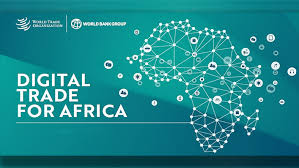The WTO Secretariat and the World Bank have successfully completed the pilot phase of their joint initiative, “Digital Trade for Africa,” culminating in the publication of digital trade assessments for six African countries: Benin, Côte d’Ivoire, Ghana, Kenya, Nigeria, and Rwanda.
During an information session on 25 September, both organizations briefed WTO members on the project’s key findings and demonstrated practical tools to broaden its application. Initiated in 2023, the project aims to support African countries in fully harnessing the benefits of digital trade and enhancing their development prospects.
Deputy Director-General Johanna Hill highlighted the project’s progress since the 2023 World Bank–WTO policy note calling for stronger digital trade regulations. She noted that its official launch at the 13th WTO Ministerial Conference in February 2024 initiated pilot Digital Trade Reviews in six African countries to identify key policy actions.
Hill emphasized the project’s alignment with broader WTO e-commerce initiatives and its role in bridging the digital divide. The release of six country assessment reports and a stocktake note at the WTO Public Forum in September 2024 generated momentum for expanding the project to other regions, including Latin America and the Caribbean.
Experts from the WTO and World Bank presented key findings showing significant improvements in digital connectivity, growth in digitally delivered services, and progress in regulatory areas such as e-invoicing and e-signatures, though challenges remain in cross-border data flows and consumer protection. The project’s standardized assessment template can now be replicated across additional countries.
The World Bank also reaffirmed its support for Africa’s digital trade agenda, particularly through the African Union’s Single Digital Market Vision 2030, which promotes integrated digital markets and improved cross-border infrastructure.
Concluding the session, Deputy Director-General Xiangchen Zhang reiterated the WTO’s commitment to providing tailored technical assistance to the pilot countries and expanding partnerships to extend these benefits to other developing nations.

Potential Benefits to African Trade: The “Digital Trade for Africa” initiative offers substantial potential to transform Africa’s trade landscape by enhancing digital infrastructure, improving connectivity, and enabling broader participation in global e-commerce. Through regulatory harmonization and capacity-building, it can reduce barriers to cross-border transactions, attract investment, and align national policies with international standards — allowing African countries to leverage WTO frameworks for a stronger presence in digital services trade.
In addition, the initiative’s support for the African Union’s Single Digital Market Vision 2030 promotes regional integration and innovation, fostering growth in intra-African trade. Tailored technical assistance and knowledge-sharing will further strengthen institutional capacity and ensure sustainable digital ecosystems. Collectively, these efforts mark a major step toward inclusive digital transformation and increased competitiveness for African economies in the global digital marketplace.
